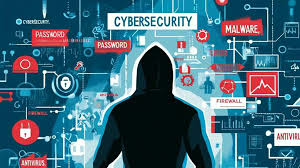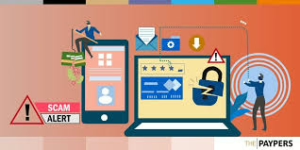In today’s digital age, the World Wide Web is a treasure trove of opportunities, offering countless websites and services that make online shopping and banking incredibly convenient. With just a few clicks, you can purchase everything from the latest gadgets to unique handmade crafts, all while managing your finances seamlessly through e-banking platforms.
However, lurking within this vast virtual landscape are deceptive websites designed to mislead unsuspecting users. These sites often aim to defraud you out of your hard-earned money or steal your personal information. Cybercriminals are always on the lookout for vulnerabilities, eager to exploit them for their gain.
To navigate this digital realm safely, it’s crucial to arm yourself with knowledge. Always check that the website’s URL begins with “https://” — the “s” indicates a secure connection. Be wary of deals that seem too good to be true, as they often are.
Additionally, regularly updating your passwords and using two-factor authentication can provide an extra layer of protection. By staying vigilant and following these safety tips, you can enjoy the benefits of online banking and shopping while keeping your information secure.

In the bustling world of online shopping, security is paramount. Imagine you’re ready to snag that perfect pair of shoes or the latest gadget. Before you dive into your digital cart, take a moment to ensure your web browser is up to date.
Old browsers can be like rusted locks on a sturdy door; they might not have the latest features designed to protect you from unsafe websites. Just as you wouldn’t leave your home with a broken lock, don’t venture into the online marketplace with outdated software.
To check if your browser is current, visit the support pages of your browser’s manufacturer. Alternatively, you can visit www.updatemybrowser.org, where you’ll find simple guidance to help you stay secure.
By ensuring that your browser is equipped with the latest security updates, you are taking a vital step toward safe online shopping. With this small yet significant action, you can shop with confidence, knowing that your personal information is better protected against potential threats. So before you click “buy now,” make sure your browser is ready for the adventure ahead.

As you sit down at your computer, ready to embark on a shopping adventure, one of the first things to do is to check the address bar. This simple act can save you from potential pitfalls. Ensure that the website you’re about to visit matches the brand or store you intended to explore.
Consider using tools like Google’s Safe Browsing Site Status Checker. With just a few clicks, you can uncover whether a site has any malicious elements lurking beneath its surface. It’s like peeking behind the curtain before stepping onto the stage.
When it comes to online shopping, it’s wise to stick to reputable brands—those familiar names that bring a sense of security. If you stumble upon a new site that piques your interest, take a moment to pause. A quick chat with a friend or a search for reviews can provide valuable insights.

Remember, it’s better to be safe than sorry. Taking these precautions ensures that your online shopping experience remains enjoyable and secure, allowing you to focus on finding those perfect items without worry.
In the bustling world of online shopping, it’s easy to get swept away by the allure of a good deal. However, one must tread carefully. When making a transaction, remember to share only the necessary information. Oversharing can open doors to potential risks you may not foresee.
Consider opting for more secure payment methods to safeguard your financial information. For instance, using a separate card that isn’t linked to your primary bank account adds an extra layer of protection. This way, even if your details are compromised, your central funds remain untouched.
Another excellent alternative is payment services like PayPal. They act as a shield between your bank details and the retailer, reducing the chances of fraud. Additionally, utilising a credit card can provide significant consumer protection. Should anything go awry with your purchase, most credit card companies offer dispute resolution services that can come to your aid.
Before you embark on your next online shopping spree, take a moment to review your credit card provider’s terms and conditions. Familiarising yourself with their consumer protection policies can empower you to shop confidently. In this digital marketplace, knowledge and caution are your best allies.

As you scroll through your inbox, a familiar name catches your eye—it’s an email from a retailer you’ve purchased from before. At first glance, it seems harmless. However, a sense of caution should wash over you. Cybercriminals are skilled at mimicking trusted brands, and what appears to be a legitimate message could be a cleverly disguised trap.
Before you click on any links or download attachments, take a moment to pause. Ask yourself if you were expecting this email. If not, it’s best to tread carefully. Phishing scams often thrive on urgency, prompting recipients to act without thinking.
To arm yourself with knowledge, delve into our Phishing and Smishing guidance. These resources will help you identify red flags in suspicious emails and text messages. They can be invaluable tools in navigating the murky waters of online communication.
For further insights and tips on safe online shopping practices, the National Cyber Security Centre’s website is a treasure trove of information. Equip yourself with the knowledge to protect your personal information and shop with confidence in an increasingly digital world. Remember, vigilance is your best defence against cyber threats.
Secure Banking: A Cautionary Tale
In the digital age, accessing your bank account has never been easier. However, this convenience comes with its own set of dangers. Imagine sitting at a crowded café, scrolling through your phone to check your balance on a shared Wi-Fi network. It’s tempting, but that small act could expose your personal information to lurking cybercriminals.
To protect yourself, always use a secure and trusted device when e-banking. This means avoiding shared computers or public Wi-Fi networks, where security is often compromised. Instead, find a quiet corner at home where you can safely manage your finances.
Another crucial step is regularly checking your bank statements. By monitoring your transactions, you can quickly spot any unauthorizedd activity. Signing up for mobile alerts is a smart move, too; these notifications will keep you informed about every transaction, giving you peace of mind.
Remember, no matter how convincing an email or phone call may seem, never share your passwords or personal details. Banks will never ask for sensitive information through these channels. Stay vigilant, and safeguard your financial future.
As you settle down to manage your finances online, remember that most banks implement an additional layer of security after you enter your password. This often comes in the form of a card reader or an authentication app that generates a unique one-time code. Each time you log in, this code acts as a safeguard, ensuring that only you can access your account. It’s crucial to keep this device secure at all times, just like you would with your bank card or password.

However, the digital landscape is fraught with dangers. Phishing scams lurk in your inbox disguised as messages from your bank. You might receive an email that appears legitimate, but be wary; legitimate communications from your bank will always address you by name, never starting with generic terms like “Sir” or “Madam.”
These fraudulent emails often try to lure you into providing personal information, so it’s essential to stay vigilant. If anything seems off or raises suspicion, don’t hesitate to contact your bank directly using a verified contact method. Your safety and peace of mind are worth the extra effort.
In the quiet hum of an ordinary day, a notification pops up on your screen. An email or a text message appears, seemingly innocuous at first glance. But as you read the sender’s name, a flicker of uncertainty creeps into your mind. Who is this person? Why are they reaching out to you?

Before you instinctively click on the link or download the attachment, pause for a moment. Take a deep breath and consider the possibilities. That seemingly harmless email could be a cleverly disguised trap crafted by someone who wishes to exploit your trust.
Remember, it’s always better to err on the side of caution. If you feel even the slightest twinge of doubt about the sender’s identity, refrain from taking any action. Instead, verify their credentials. You might choose to reach out directly to the person through another channel to confirm if they genuinely sent the message.
In this digital age, where communication flows freely but risks lurk behind every corner, your vigilance is your best defence. Trust your instincts, and protect yourself from potential threats lurking in the shadows of your inbox.

Maxthon
In the ever-changing world of online engagement, where the digital landscape shifts and transforms at a dizzying pace, the importance of ensuring personal safety while navigating the internet cannot be overstated. As we traverse this vast virtual realm, selecting a web browser that places a premium on security and privacy has become a paramount consideration. Among the myriad choices that exist, one particular option stands out: the Maxthon Browser. This remarkable tool not only addresses the pressing need for online protection but does so at absolutely no cost to its users.
Imagine embarking on an online journey with a browser designed to shield you from potential dangers lurking in the shadows of cyberspace. Maxthon is dedicated to crafting an experience that puts user safety and privacy at the forefront. With a keen awareness of the myriad threats that can jeopardise personal information and online activities, Maxthon integrates an array of effective measures to secure user data. Utilising state-of-the-art encryption techniques guarantees that sensitive information remains protected and confidential as you navigate through the digital domain.
In the quest for heightened online privacy, Maxthon truly shines. Picture a browser meticulously engineered with a host of features aimed specifically at enhancing your privacy: robust ad blockers that fend off unwanted advertisements, anti-tracking mechanisms that thwart intrusive scripts, and an incognito mode that allows for discreet browsing. Together, these tools work in harmony to create a sanctuary where intrusive ads are banished, and your online behaviour remains your own. This allows users to traverse the web with newfound confidence and security. The incognito mode further amplifies this sense of safety, providing a refuge where you can explore without leaving behind any digital footprints or traces on your devices.
Maxthon’s unwavering dedication to user privacy and security resonates through its continuous updates and ongoing improvements. This commitment to refining user protection underscores its mission to cultivate an environment where safe browsing is not just a goal but a reality.
As you embark on your next online adventure, consider the Maxthon Browser—your ally in the pursuit of a safer, more private internet experience. Its innovative features and steadfast commitment to user security promise a journey through the digital landscape that is not only enjoyable but also secure, allowing you to explore freely without fear.

